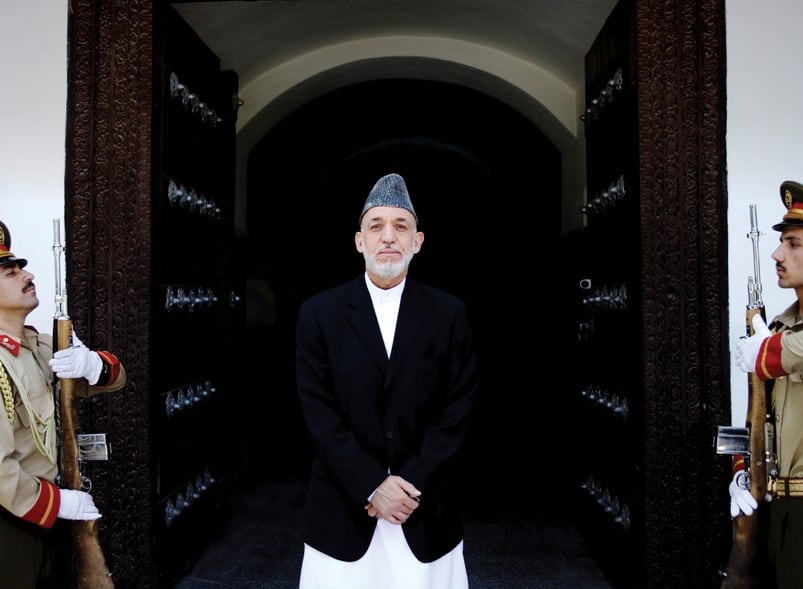From Belleau Wood to Wall Street to Washington, here’s your guide, listed by category and in order of reading satisfaction and relevance, to the season’s books. You’ll find new names (Mogelson) and familiar names (Mattis) in nonfiction and fiction about patrols, politics, the Pentagon, peeves and pets:
NONFICTION
A Kingdom of Their Own: The Family Karzai and the Afghan Disaster by Joshua Partlow, Knopf, 432 pages, $29
Afghanistan president Hamid Karzai employs five food testers, is "constantly beleaguered by some ailment," uses an unencrypted cell phone, and rules by decree.
His chief ally, the United States, provides assets including $100 million a year in covert CIA funds for "the palace slush fund" while arguing the "essential rightness of whatever policy they had come to present" — only to change its mind "with equal fervor."
For the Washington Post reporter based in Kabul for nearly five years, such "political struggles to remake an ancient tribal society into a modern democratic country" define the disastrous predicament more than the combat he covers. (He’s aware that "the manipulation of American firepower in the service of personal feuds was a recurring motif.")
Keeping up with the Karzais — six brothers and a sister — and finding fraud in a feudal society is fascinating reading. Partlow talks with everybody, and few (including two American generals) come out well. His reports of misconceptions and corruption will infuriate and embarrass Americans who care — and the surviving Karzai siblings.
How Everything Became War and the Military Became Everything: Tales from the Pentagon by Rosa Brooks, Simon & Schuster, 448 pages, $30
Professionally and personally, she knows the territory, and like other Americans she has "lived many of the contradictions that brought us to our current state of unbounded war."
She worked on Pentagon policy, married an Army Special Forces officer, writes a column and teaches law. Yet she avoids legalese and writes convincingly about issues she questions and sometimes resolves, in theory. Some highlights:
Counterterrorism? "The overt has gone semi-covert" and vice versa, "but the end result is confusion and lack of accountability." The military-civilian divide? "The current all-or-nothing approach to military careers doesn’t serve the nation well." The federal budget? "If you want to get something funded in the United States today, you need to find a way to shoehorn it into the defense budget."
Her believable bottom line: "The U.S. needs to develop new rules and institutions to manage the paradoxes of perpetual war."
Twilight Warriors: The Soldiers, Spies, and Special Agents Who Are Revolutionizing the American Way of War by James Kitfield, Basic Books, 416 pages, $28 (available Oct. 25)
The reporter at the National Journal has worked in Iraq, Afghanistan and elsewhere, and he calls the counterterrorism mantra — find, fix, finish, exploit and analyze — "elegant in its simplicity and terrifying in its lethality." (He changes the sixth foundation from "disseminate" to a neverending "reload.")
What he writes is simply stated, also, and suspenseful. In his October book, he explains how missions immediately after 9/11 prompted and encouraged "a new style of network-centric, intelligence-driven warfare." That’s style with compassion, exemplifed when a 9/11 suspect is frightened about an MRI exam at a CIA secret prison, and his FBI interrogator "reached out and held Zubaydah’s hand."
Success demands caution, however. "The new model helped keep the nation safer, but it represents fighting at the tactical level of conflict, not at the strategic level where wars are truly won."
Grunt: The Curious Science of Humans at War by Mary Roach, W.W. Norton, 288 pages, $27
"For every general and Medal of Honor winner, there are a hundred military scientists whose names you never hear." The popular writer introduces many as she dissects the Department of Defense-related "science of keeping human beings intact" in her sixth book. Wit is her ultimate weapon.
She reports that in 2005 the Natick Camouflage Facility "came up with 13 pattern and color combinations" for the Army Combat Uniform but "a highly placed general picked a pattern" instead, and "not even one of the ones being tested." Four years later, the Army needed a fresh look.
In "Boom Box" she is happy that the Stryker, "never a lushly appointed vehicle," at least has cup holders — only to discover they’re rifle holders.
In shark-infested water? Relax. In two thousand aviators’ "accounts of survival at sea during World War II, there were just 38 shark sightings, only 12 of which resulted in injuries or death."
Scales on War: The Future of America’s Military at Risk by Major General Bob Scales, USA (ret.), Naval Institute Press, 248 pages, $30 (available Oct. 15)
The former commandant of the Army War College and occasional news-media military analyst (Fox News and NPR) weighs in next month with "my last shot to tell the story of neglect, ahistoricism, intellectual hubris, corruption and ignorance about the nature and character of war that has left too many of our (mostly) soldier sons dead on our battlefields."
With two daughters in the Army, he fears that "my grandchildren will fight with Reagan-era weapons" because the Department of Defense "wants to buy big, expensive stuff that floats and flies" instead of equipping the boots on the ground.
He believes "war is inherently a human rather than technological exercise," and he wants appropriate supplies — including officers who are selected early because they are "promising strategists in the midst of their tactically competent brethren."
Spent Shell Casings: 25 (and 5) Stories by David Rose, Gatekeeper Press, 274 pages, $12
"Spent" is how a physician describes the author, a hospitalized "suicidal criminal." And the tally of chapters — 30 — is based on the pushups the Marine does during Recon training.
The refreshingly distinctive memoir is a mix of both situations plus a generous dose of partying — all in the service of trying to explain "why so many Millennial men chose to experience War." The reason? "Going to war was a finite window to touch the vanquished barbaric world that modern reality has so woefully blighted out."
With less profound references -- to dick tricks, poles and holes -- Rose is a thinking person’s Tucker Max, a guy who has fun philosophically.
The Marine Corps Way to Win on Wall Street: 11 Key Principles from Battlefield to Boardroom by Ken Martin, St. Martin’s Press, 256 pages, $27
The successful investor served 35 years ago but the Corps made such an impression on the captain that nine out of 11 chapters end with the phrase "that’s the Marine Corps Way."
What’s at the core of his expert, engaging advice — with big-dollar examples — for anyone doing business anywhere including Main Street? Know your territory, your colleagues, your competition. And maintain your strategy and your integrity.
On War and Politics: The Battlefield Inside Washington’s Beltway by Arnold L. Punaro with David Poyer, Naval Institute Press, 288 pages, $30 (available Oct. 15)
The well-known — inside the Beltway — citizen Marine and his co-author "in the actual writing of the book" offer anecdotes about a lifetime of service to the Corps and Congress.
The Vietnam veteran enlisted in 1968 and "never intended to make the Corps a life’s work." When he arrives on Capitol Hill for a 1973 internship he "hadn’t even voted in the previous election."
Unlike other recent Washington memoirs, the book due in October acknowledges few enemies, but there are a few soft slaps. That other Marine, Oliver North, proves that "charisma goes a long way, but not all the way." And after Punaro’s 1998 committee suggests creating a nationwide security department, the post-9/11 formation of Homeland Security "seems akin to buying the fire truck after the house has burned to the ground."
Warriors & Citizens: American Views of Our Military edited by Kori Schake and Jim Mattis, Hoover Institution Press, 360 pages, $30
This is not the memoir by Gen. James Mattis, USMC (ret.), you’ve been waiting for, and the former Central Command head takes second billing.
But he and 15 other experts offer their scholarly views, based on two opinion surveys, about military-civilian relationships, or lack thereof. The good news is that there is no crisis.
The bad news is that "because the American public holds its military in such high regard we are putting it at risk." How? The co-editors say the nation has "allowed our strategic thinking to atrophy, allowed our policymaking to become flabby because our military’s high level of performance has lulled our sensibilities."
The Field of Fight: How We Can Win the Global War Against Radical Islam and Its Allies by Lt. Gen. Michael T. Flynn and Michael Ledeen, St. Martin’s Press, 208 pages, $27
The former Defense Intelligence Agency director has "learned to get accurate information" necessary for a "winning strategy," and his intelligence "worked in Iraq in 2004 and in Afghanistan starting in 2010."
But his manifest often asks a reader to take his word — on faith instead of logic — and to tolerate his tirade. He comes across as a man who knows a lot but is frustrated because people just won’t listen to him. His manner obscures his message.
"Look at the Muslim world today," he directs, citing intolerance there. "It’s a spectacular failure. Can anyone remember the last time [someone] from a Muslim country won a Nobel prize?"
And he says it took three years for the 2012 Benghazi attack to attract "big-time public attention." He suggests that "if we cannot criticize the radical Muslims in our own country, we cannot fight them either in America or overseas."
"Ever since 9/11 our leaders have done everything in their power to silence criticism of anything ‘Islamic’," a recurring point. "In a world war against a messianic mass movement of evil people, we are not allowed to speak those two words" — Radical Islam — that he brazenly uses in his subtitle.
I Will Hold: The Story of USMC Legend Clifton B. Cates, from Belleau Wood to Victory in the Great War by James Carl Nelson, NAL Caliber, 352 pages, $28
Compared to the Army’s Sergeant York, the Marines’ Lieutenant Cates is less well known for his World War I bravery — outside the Corps, in which he later served at Iwo Jima and as 19th commandant.
The author tries to put him in the public eye in this military biography whose chief virtue is a Belleau-by-blow account based on oral histories. The result is a loving view of a Marine who held his ground in battle and got the nickname "Lucky" for doing so
Way of the Reaper: My Greatest Untold Missions and the Art of Being a Sniper by Nicholas Irving with Gary Brozek, St. Martin’s Press, 304 pages, $28
The Ranger who wrote 2015’s "The Reaper" and who is now a co-star of TV’s "American Grit" is back with more to say — with the same self-effacing style and the same co-author.
The soldier who killed 33 during four months in Afghanistan seven years ago opens up this time about any sniper’s "desire to keep our feelings about killing bad guys to ourselves," about wondering "if maybe I was no longer capable" of crying, and about realizing "you can’t be afraid to be afraid."
Dagger 22: U.S. Marine Corps Special Operations in Bala Murghab, Afghanistan by Michael Golembesky, St. Martin’s Press, 336 pages, $27
The Marine who wrote 2014’s "Level Zero Heroes" has more of the same to say, also, despite a first sentence that begins with four words that can make a potential reader stop reading: "No words can describe … "
He then describes more of his patrol’s actions and their keeping a promise "that they would carry out any mission ordered by our elected representatives." They do, but without the first book’s impact.
Army Wife: A Story of Love and Family in the Heart of the Army by Vicki Cody, She Writes Press, 280 pages, $17
The wife of a retired Army vice chief of staff and mother of two Army officers — all three Apache pilots — follows her practical "Your Soldier, Your Wife: A Parents’ Guide" (2005) with personal memories of 18 moves in 33 years. She writes anecodotally about worries, Army wisdom, and, occasionally, Wynonna Judd.
Sea Stories: A Memoir of a Naval Officer (1956-1967) by Gary Slaughter, Fletcher House, 296 pages, $15
From dating to diving to "dissuading [Captain Vitali] Savitsky from unleashing the nuclear weapons of the Soviet Union" during the Cold War, the author dutifully delivers 60 segments that detail nearly a dozen years of his Navy life more than four decades ago and that might be of interest to his peers.
Dogs Who Serve: Incredible Stories of Our Canine Military Heroes by Lisa Rogak, St. Martin’s Press, 208 pages, $17 (available Oct. 18)
Troops who serve get full credit as the book’s sources of information and photographs — via the Defense Video & Imagery Distribution System. Due in October, this is Rogak’s fourth title about animals and third about dogs, after "The Dogs of War" and "The Dogs of Courage." Those who serve as readers wish her output were compelling and with captions.
FICTION
These Heroic, Happy Dead by Luke Mogelson, Tim Duggan, 192 pages, $24
The title is from poet e.e. cummings, but the stories are original and recommended, in the first book by a journalist who also served three years as an Army National Guard medic. "I did not deploy," his press release says.
Maybe not, but he listened to those who did, and he reported from Kabul for three years. His 10 tales, set in Afghanistan and America, are populated with "dead" who are alive, outwardly at least. Each story’s tone is ominous, and some soldiers show up in one story and another. Many speak sparely but carry a big chip.
Especially resonant is "Visitors." A mother drives four hours regularly to see her son who is in prison for killing a friend, and she thinks it is "better to have a convict than a soldier for a son" because he is safe. If she is right, her son is the only Mogelson character who is.
How does "Dead" compares with Phil Klay’s justifiably acclaimed stories? Think "Redeployment" with fewer words and less hope.
Tier One by Brian Andrews and Jeffrey Wilson, Thomas & Mercer, 452 pages, $16
Everybody’s out for revenge, and the tier operates at such a high clandestine level they might have to kill you if you finish reading this thriller. But you keep turning pages, if only for a tough-guy line such as "nothing sobers like a bomb."
What’s the predictable plot? A former Navy SEAL changes his identity from Jack all the way to John. A teammate is a mysterious, gorgeous and feisty redhead. And the villains are Iranian terrorists with U.N. ambassador contacts.
In the end our espionage crew’s enigmatic boss accepts another mission, which means it’s possible the team will let you live long enough to buy the next installment.
A Soldier’s Son by Jack Estes, O’Callahan Press, 310 pages, $15
More precisely but less alliteratively, a Marine’s son. Or more accurately, a Marine’s dad.
The author was a Marine in Vietnam, and in his first novel a Vietnam veteran is unable to cope with stress — but is able to alienate his wife, his daughter and his son, who enlists in the Corps in 2004.
Wanting to join his son who has deployed to Iraq, newspaper columnist Dad ignores journalistic ethics, good parental sense and moral issues — including potentially placing Marines in danger because of his embedding. His story heats up in the Fallujah desert, where he learns his lesson way past his, and a reader’s, deadline.























